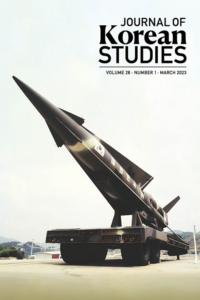
Seung-Mi Han
Journal of Korean Studies (2023) 28 (1): 163–191
Abstract: This article deals with the Korean-Chinese politics of recognition in contemporary South Korea. Unlike North Korean settlers who are “technically” embraced from the outset as coethnics, the Korean-Chinese are located in the interstices of the Act on the Employment of Foreign Workers, the Overseas Koreans Act, and the Multicultural Families Support Act. By analyzing how the Korean-Chinese politics of belonging is mediated by competing models of nationalism, multiculturalism, and political participation that Korean-Chinese bring with them from the People’s Republic of China and encounter anew in South Korea, the article puts into relief the various choices available to these migrants and their emotionally-charged disagreements over how to define themselves culturally and politically. Juxtaposing Korean-style multicultural policy with a curiously muted cultural distinctiveness in the Korean-Chinese politics of recognition, the article argues for the importance of cherishing cultural diversity in the public sphere, even for the coethnic politics of belonging.
About the author: Seung-Mi Han was a HYI Visiting Scholar from 2004-05.
